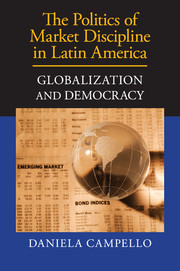Book contents
- Frontmatter
- Dedication
- Contents
- List of Illustrations
- List of Tables
- Acknowledgments
- 1 Globalization, Democracy, and Market Discipline
- 2 Between Votes and Capital: Redistribution and Uncertainty in Unequal Democracies
- 3 Investors' “Vote” in Presidential Elections
- 4 The Politics of Currency Booms and Crises: Explaining the Influence of Investors' “Vote”
- 5 Currency Crisis, Policy Switch, and Ideological Convergence in Brazil
- 6 Exogenous Shocks and Investors' Political Clout in Ecuador
- 7 One President, Different Scenarios: Crisis, Boom, and Market Discipline in Venezuela
- 8 “Vivir con Lo Nuestro”: Default and Market Discipline in Argentina
- 9 Who Governs? Market Discipline in the Developed World
- 10 Conclusion: Markets' Vote and Democratic Politics
- References
- Index
2 - Between Votes and Capital: Redistribution and Uncertainty in Unequal Democracies
Published online by Cambridge University Press: 05 April 2015
- Frontmatter
- Dedication
- Contents
- List of Illustrations
- List of Tables
- Acknowledgments
- 1 Globalization, Democracy, and Market Discipline
- 2 Between Votes and Capital: Redistribution and Uncertainty in Unequal Democracies
- 3 Investors' “Vote” in Presidential Elections
- 4 The Politics of Currency Booms and Crises: Explaining the Influence of Investors' “Vote”
- 5 Currency Crisis, Policy Switch, and Ideological Convergence in Brazil
- 6 Exogenous Shocks and Investors' Political Clout in Ecuador
- 7 One President, Different Scenarios: Crisis, Boom, and Market Discipline in Venezuela
- 8 “Vivir con Lo Nuestro”: Default and Market Discipline in Argentina
- 9 Who Governs? Market Discipline in the Developed World
- 10 Conclusion: Markets' Vote and Democratic Politics
- References
- Index
Summary
If we lived in a world of complete information, the Brazilian Workers' Party (Partido dos Trabalhadores [PT]) would have anticipated financial market panic during the 2002 presidential election. Knowing the severe consequences it entailed, the then candidate Lula da Silva would probably have moderated his agenda already at the outset of his presidential campaign.
It is also plausible to imagine that Lula's team was aware of the constraints imposed on PT's leftist policies but, assuming that voters were not, deliberately chose to move rightward only after inauguration, not to risk losing the election.
Most probably, however, the PT leadership simply failed to anticipate investors' panic in 2002. It might have overlooked the fact that the Asian and Russian crises of the late 1990s, as well as the Argentine default in 2001 had biased international financial markets against emerging economies, increasing investors' sensitivity to the unfavorable policies associated with Lula's victory. In a more positive scenario, markets' reactions might not have been as severe.
Whatever the real story is, it would be reasonable to expect that after the shift rightward in 2002 Lula would have difficulties reinstating PT's historical agenda when running for reelection in 2006. After all, voters and markets had four years to update their beliefs about the policies likely to be enacted in his second term.
This is, actually, what happened; Lula's presidential program in 2006 by no means resembled the ones announced in the 1989, 1994, or 1998 elections. Rather, it consolidated the move rightward that transpired in 2002, in a trend that persisted with his successor Dilma Roussef in 2010. The Brazilian experience is thus coherent with claims that the threat of capital flight pushes the Left into adopting neoliberal, investor-friendly policies.
Yet, as highlighted in the previous chapter, not all Latin American countries experienced the same policy convergence. In Ecuador, Rafael Correa advanced the left-wing program announced during the 2006 presidential campaign, even though the former leftist president Lucio Gutiéerrez had embraced a neoliberal agenda. In Venezuela, Cháavez pursued orthodox economic policies during the first years in office, but reverted to his original program afterwards.
- Type
- Chapter
- Information
- The Politics of Market Discipline in Latin AmericaGlobalization and Democracy, pp. 26 - 44Publisher: Cambridge University PressPrint publication year: 2015

